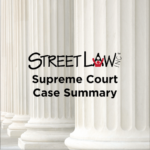Most Americans are unaware about when and where Fourth Amendment rights are at issue. This lesson will allow students to examine the text and interpretations of the Fourth Amendment to describe key terms and ideas like searches, seizures, and privacy, as well as define some of the key debates about where the Fourth Amendment is headed in an age of technology.
Owasso v. Falvo (2002)
Does the practice of peer grading violate the Family Educational Rights and Privacy Act of 1974? This case summary shows how the Supreme Court answered this question in 2002.
Civic Conversations
How do educators invest in productive, deep, and transformative dialogue in their classrooms? Civic Conversations is a collaboration between the Edward M. Kennedy Institute’s civic education programming and the community-building dialogic structure practiced by Essential Partners. Explore resources, activities, and lesson structures that support educators as they facilitate difficult conversations, create inclusive learning environments, raise complex discussions, and promote a safe space for students to consider their values and engage in their communities. Policy simulations at the Kennedy Institute reflect the wide range of issues that face our country today. Students debate the best way to reform our immigration system, consider the balance between privacy and security, and think about how to meet the challenge of climate change. As in the real Senate, it’s natural that students will disagree on the best approach to many civic issues. This collection of resources will support educators as they prepare to discuss civic issues, either in preparation for a Kennedy Institute field trip or to practice listening, sharing, and learning in the classroom.
Lawrence v. Texas (2003)
Does a Texas law that criminalizes sexual intimacy by same-sex couples violate the Fourteenth Amendment? This case summary shows how the Supreme Court answered that question in 2003.
The Pursuit of Justice
The Pursuit of Justice book, written by Kermit L. Hall and John J. Patrick, analyzes 30 Supreme Court cases chosen by a group of Supreme Court justices and leading civics educators as the most important for American citizens to understand. An additional 100 significant cases included in state history and civics standards are summarized. The complete book or individuals chapters can be downloaded.
Troxel v. Granville (2000)
The U.S. Census
This Current Events and the Constitution focuses on the U.S. Census. With the 2010 census now underway, some have concerns that the questions are too personal or that the federal government should not have access to this information. Do the questions on the 2010 census form exceed Congress’s constitutional mandate to count population every ten years “in such a manner as they shall by law direct”?
